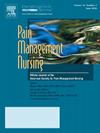Actively Waiting: Feasibility and Acceptability of a Virtual Self-Management Program Designed to Empower People With Chronic Pain Waiting for Interprofessional Care
IF 2.1
4区 医学
Q2 NURSING
引用次数: 0
Abstract
Chronic pain affects 1.9 billion people worldwide and wait times for interprofessional pain management programs can be extensive. The existing wait times provide an opportunity to introduce internet-based interventions that enhance self-management ability.
Purpose
The purpose of this study was to examine the feasibility, acceptability, engagement, and meaningfulness of an online program designed to enhance the readiness for change and self-management.
Design
Participants (N = 61) waiting for interprofessional chronic pain care at two centers were assigned to engage in either a series of eight self-directed web-based modules or engage in the modules with the addition of four one-on-one sessions delivered by coaches trained in motivational interviewing techniques.
Methods
We collected participant demographics, feasibility and engagement metrics, and pre and post intervention questionnaires. A subset of participants from each group participated in an interview (n = 22).
Results
The use of online modules was found to be feasible and acceptable for participants and engagement varied depending on individual preference and between modules. Participants noted that the content and approach were relevant and meaningful, influencing changes in thinking and behaviour around pain self-management. Exploratory analyses were performed and supported improvement in self-efficacy and chronic pain acceptance outcomes in both groups. Coaching did not augment improvements in any of our outcomes.
Conclusions and Clinical Implications
The use of a self-directed web-based chronic pain and motivational empowerment program appears to be a promising option to support people waiting for specialist care and may influence readiness for interprofessional care.
积极等待:一个虚拟自我管理程序的可行性和可接受性,旨在授权慢性疼痛患者等待跨专业护理。
慢性疼痛影响着全世界19亿人,而跨专业疼痛管理项目的等待时间可能很长。现有的等待时间为引入基于互联网的干预措施提供了机会,提高了自我管理能力。目的:本研究的目的是考察在线课程的可行性、可接受性、参与度和意义,该课程旨在提高学生对变革和自我管理的准备程度。设计:在两个中心等待跨专业慢性疼痛治疗的参与者(N = 61)被分配参加一系列八个自我指导的基于网络的模块,或者参加由训练过动机性访谈技术的教练提供的四个一对一的模块。方法:我们收集了参与者的人口统计数据、可行性和参与度指标,以及干预前后的问卷。每组参与者的一个子集参加了一次访谈(n = 22)。结果:发现在线模块的使用对参与者来说是可行和可接受的,并且参与程度取决于个人偏好和模块之间的差异。与会者指出,内容和方法是相关和有意义的,影响了有关疼痛自我管理的思想和行为的变化。进行了探索性分析,并支持两组自我效能和慢性疼痛接受结果的改善。指导并没有增加我们任何结果的改善。结论和临床意义:使用自我导向的基于网络的慢性疼痛和动机授权计划似乎是一个有希望的选择,以支持等待专科护理的人,并可能影响对跨专业护理的准备。
本文章由计算机程序翻译,如有差异,请以英文原文为准。
求助全文
约1分钟内获得全文
求助全文
来源期刊

Pain Management Nursing
医学-护理
CiteScore
3.00
自引率
5.90%
发文量
187
审稿时长
>12 weeks
期刊介绍:
This peer-reviewed journal offers a unique focus on the realm of pain management as it applies to nursing. Original and review articles from experts in the field offer key insights in the areas of clinical practice, advocacy, education, administration, and research. Additional features include practice guidelines and pharmacology updates.
 求助内容:
求助内容: 应助结果提醒方式:
应助结果提醒方式:


